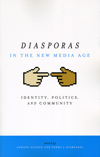Diasporas in the New Media Age
Once upon a time, I could really get into this kind of writing. The title intrigued me. The topic was captivating. The whole idea of merging the concepts of new media and diaspora was fascinating. And then, I read the book. While the compilation spans a great breadth of “diaspora,” and as such is an inclusive and interesting mix of authors and definitions, the mix also falls flat as the connections between the various communities and medias the contributors talk about are hard to hold on to. For example, looking at the Digital Diaspora of India as seen in the growing emergence of Bollywood caricatures and Indian-ness in Second Life (“3D Indian (Digital) Diasporas” by Radhika Gajjala), juxtaposed with the use of social networking and Orkut in the outlanders of Brazil (“Tidelike Diasporas in Brazil: From Slavery to Orkut” by Javier Bustamante). The overarching understanding tacit in most of the contributors’ writing was that societal bonds, while already tenuous in splintered or diasporic communities, may be further impacted by the use and creation of “virtual” communities that reify or overblow particular essences of the original community (especially in “Maintaining Transnational Identity: A Content Analysis of Web Pages Constructed by Second-Generation Caribbeans” by Dwaine Plaza).
Once upon a time, I could really get into this kind of writing. The title intrigued me. The topic was captivating. The whole idea of merging the concepts of new media and diaspora was fascinating. And then, I read the book. While the compilation spans a great breadth of “diaspora,” and as such is an inclusive and interesting mix of authors and definitions, the mix also falls flat as the connections between the various communities and medias the contributors talk about are hard to hold on to. For example, looking at the Digital Diaspora of India as seen in the growing emergence of Bollywood caricatures and Indian-ness in Second Life (“3D Indian (Digital) Diasporas” by Radhika Gajjala), juxtaposed with the use of social networking and Orkut in the outlanders of Brazil (“Tidelike Diasporas in Brazil: From Slavery to Orkut” by Javier Bustamante). The overarching understanding tacit in most of the contributors’ writing was that societal bonds, while already tenuous in splintered or diasporic communities, may be further impacted by the use and creation of “virtual” communities that reify or overblow particular essences of the original community (especially in “Maintaining Transnational Identity: A Content Analysis of Web Pages Constructed by Second-Generation Caribbeans” by Dwaine Plaza).
Or even further, that digital community history can be seen to allow the . . .Yawn. I forgot what I meant to say. Let me be frank here (or Sally, depending upon what’s needed). This book has great potential for someone who might be researching community dynamics and the effects that could possibly come from this move into using new media to maintain and create community connections. This book is not an explanation of Facebook in the Hmong or Kosovar refugee communities worldwide. It does, however, point out some startling similarities in what is understood about these digital communities. It would seem that many of the contributors buy in to the concept of “McArabism” (“‘Cybernaut’ Diaspora: Arab Diaspora in Germany” by Khalil Rinnawi), in some form or another. In other words, communities of immigrants, émigrés, and other displaced people create and rally around symbols and habits that reify some of the most culturally visible iconography, whether or not that iconography meant something to them initially. It is the boiling down of culture to its most blatant. And that holds people together, when economics, politics, and conflict work together to tear people apart. The language is lofty. The concepts are often explained at length, but the book offers a platform for many different contributors to share their research into some very esoteric fields. And everyone deserves to be heard.





